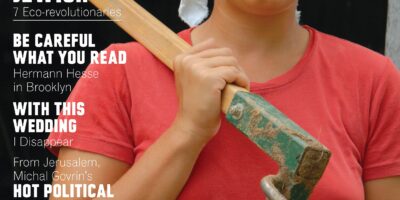Betsy Teutsch—Modeling Thoughtful Consumption
Not long ago, my father died — he was a frugal, modest guy — and I came into some money. Woo. I needed to think about what to do with this money, and it struck me, even though our culture encourages constant material acquisition, that I really had everything I needed. I started www.moneychangesthings.blogspot.com to mull it all over, to write about my personal decision-making processes when it comes to buying, and to write about wanting to be part of the “solution” — I can afford it.
For some years, for example, I had wanted a Prius, kind of as a “vanity item,” and because I felt embarrassed to be seen driving around in my mini-SUV, a 1999 Subaru Forrester. It really made no sense for me to get rid of the Forrester, though — it had only logged 50,000 miles. I decided, instead of the Prius, to drive as little as possible, and to keep track of my mileage. Over time, I “localized” my life, relocating my hairdresser, doctor, masseuse and bank. I biked, walked, used mass transit and ride-pooled — the latter is pleasantly social — and got my mileage down to 2500 miles a year. People in my circumstances can edit their lives enormously, without sacrificing quality-of-life. And the act of editing is a very spiritual one, because you’re saying, “I have what I need.”
I blogged about my decision to buy a second frying pan — it took me 25 years to give myself permission to do that! — and about how the purchase made a huge difference to me. I didn’t have to wait until one whole batch of schnitzel was finished before I could start the next one. You can spend $15 and really experience a quality-of-life improvement; buying a second house may not contribute as much to your sense of well-being.
Recycling bins in Israel also interested me. They are standard in most neighborhoods, and are huge, room-sized cages made of wire, with holes the width of a bottle. You just plop your recyclables in there. In Tel Aviv, people have turned them into works of art, with mosaic tiles, hamsas and wild things.
In 2003, I co-launched Freecycle.org in Philadelphia, an online community of people who need things and people who want to divest themselves of things. Everything is free. There is an immense amount of surplus in our culture. People get rid of boats, laptops, pianos, unused Nordic tracks. When you upgrade your camera, what do you do with your old digital one? Sometimes I think: How did all this stuff wind up in my house, most of it uninvited?
I also blogged about my husband’s mother, Hilda, a German refugee (she came to this country in 1939) who was frugal and never wasteful — habits that put me off at first; Americans really look down at thrift. I realized at some point, though, that I had become her. I save all the rubber bands that the mail comes in, and when I had a huge pile recently, I returned them to the post office. “Do people do this?” I asked the clerk at the counter. “You’re the first in 10 years,” she said.
Betsy, whom would you like to invite into Lilith’s sukkah?
Juliet Schorr, who wrote The Overworked American and The Overspent American. She describes voluntary simplicity. Fifty percent of gifts go right into the closet and are never used. Did you know that?
Who’s a significant role model?
My friend, Meenal Raval, who is further along the path than I am. She gets an idea — “this is the next thing I need to do.” Currently she’s retrofitting her house with solar panels.
What shakes your lulav?
Dual-flush toilets. They’re common in Israel, but they’re hard to procure here.
The Earth is a fragile sukkah. What one act of repair can we undertake?
Get out of your car.


